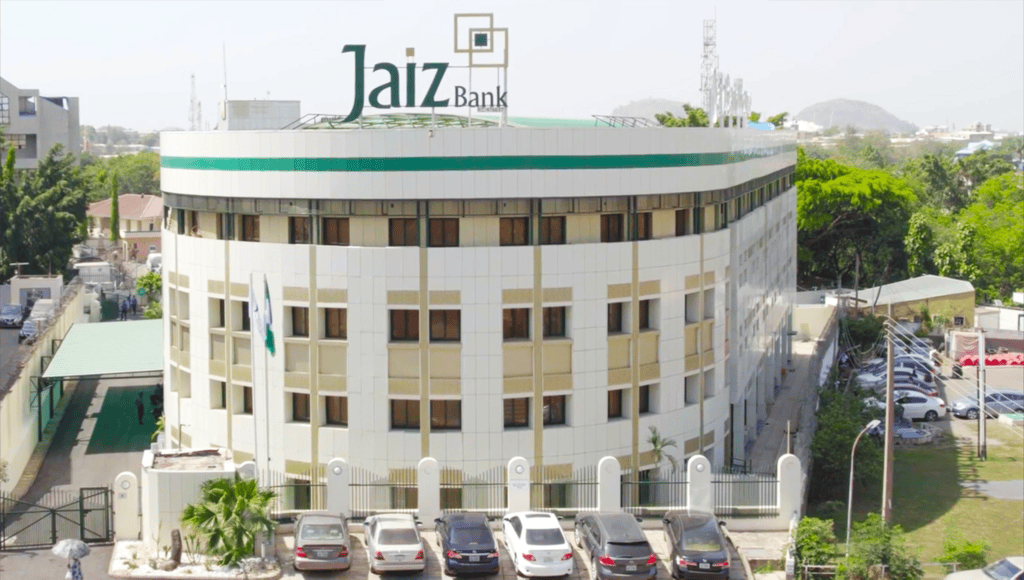
By Aida Oluwagbemiga & Abdulsalam Abduljelil Opeyemi
Nigeria’s non-interest banking sector, driven by banks like Jaiz and TAJBank, is expanding swiftly. These Shariah-compliant institutions provide ethical banking solutions. Learn about their rapid growth, income models, and how to obtain financing for major purchases in this article. Special thanks to Dr. Ammin Mustapha for editing this piece. Featured image by Hassanabdul, CC BY-SA 4.0, via Wikimedia Commons.
Non-interest Finance is growing at an unprecedented rate in the Nigerian banking sector. Banks that adopt this approach are known as Non-interest Financial Institutions (NIFIs) and are categorised as Specialised banks (Banking and other Financial Institutions Act 1991, as amended). Specialised Banks are financial institutions providing specific types of banking services or serving specific customer-groups, such as ethically-conscious citizens. It is noteworthy to mention that the Nigerian constitution has straitjacketed the use of certain names for financial institutions in Nigeria, religious names inclusive. Thus impeding the birth of Islamic banks in Nigeria. However, specialised banks are allowed to operate while adhering to religious laws such as Islamic law of contract. Those banks that align with the principles of Islamic commercial jurisprudence are referred to as Shariah-compliant banks. According to the Central Bank of Nigeria (CBN) Guidelines for the regulation and supervision of Institutions offering non-interest financial services in Nigeria, non-interest banking and finance models can be categorised in two:
- Non-interest banking and finance based on Islamic commercial jurisprudence.
- Non-interest banking and finance based on any other established non-interest principle.
This article will specifically focus on Shariah-compliant banks within the broader category of Non-interest Financial Institutions.
Non-interest Finance is growing at an unprecedented rate in the Nigerian banking sector.
As of 2012, the only bank providing full-fledged non-interest financial services in Nigeria was Jaiz Bank Plc. By 2024, the number has quadrupled, with TAJBank, Lotus Bank, AltBank, and SunTrust Bank’s Non-interest Banking (NIB) window and a few Non-interest Microfinance banks too. This growth has spurred increased interest and awareness of NIFIs, leading to a rise in questions such as:
- How do non-interest banks make profits if they do not charge interest?
- The nexus between profit and interest.
- Can non-Muslims open an account with a Shariah-compliant Bank?
- Can non-Muslims work in a Shariah-compliant Bank?
- What kind of financial products and services are offered by Non-interest banks?
- What are the essential steps to access financing for purchasing an automobile or real estate property through a non-interest bank?
During my three-year stint in the call centre unit of a NIFI, where we handled operational communications, I regularly handled inquiries about accessing finance. Throughout my time in this role, the information I provided to individuals making inquiries remained consistent.
To develop a standardised response that was easy for customers to understand, I consulted professionals in product development, risk management, and Shariah compliance/audit. Additionally, I attended several training sessions. These sessions and discussions were comprehensive and enabled me to create a practical and informative script for addressing customer inquiries.
NIFI focuses on risk-sharing, fairness, clarity, and justice, rejecting practices like usury and exploitation in contracts and businesses. The goal is to make a profit while creating economic values without harming the counterparty, society, and the economy. To achieve this, Islamic financial experts revolutionised the age-old concept of profit-making, which is endorsed in the three Abrahamic religions: Judaism, Christianity, and Islam. This concept, known as the Market Approach, is so fundamental that it underpins our daily lives. While the market approach has influenced most banking models, NIFIs take it a step further by eliminating all practices involving ‘interest.’
Non-interest banks have streamlined the concept of trade within their system, facilitating trade financing by either selling assets to customers from their own stores or via a vendor following the purchase order from their customers, while providing clarity, fairness, transparency and justice. For example, if a customer desires a car but lacks the immediate funds to purchase it, the Bank bridges the financial gap by offering a variety of financing modes and contracts, such as deferred payment plans with ownership transfer, or rent to own agreements where the client eventually gains ownership of the car upon completion of the rental period.This leads to mutual benefit for both parties. While the Bank sells the asset to the customer at a mark-up, the customer will end up fulfilling the desire to own a car, while enjoying the flexibility of instalment payment.
How do non-interest banks make profits if they do not charge interest?
NIFIs generate income through two primary channels:
- Fee-Based Income includes revenue from financial advisory much like any conventional business model, non-interest banks generate profits through strategic transactions services, placements, Sukuk underwriting, transaction fees and other service-related charges.
- Financing-Based Income comprises profits earned from Sharia-compliant financing methods such as Murabaha (trade-based financing), rental income from Ijara (leasing) and profit shares/dividends from Mudarabah/Musharakah (equity partnerships). For instance, akin to a car dealership, where cars are procured from manufacturers and sold to individuals with a profit markup, non-interest banks operate on a similar principle. In the context of Nigerian-owned automobile dealerships, cars imported from manufacturers like Audi in Germany or Toyota in Japan are not sold at the purchase price due to additional direct costs such as shipping, logistics, customs duties, and profit markup.
For non-interest banks, profitability is justified by a legal maxim known as al-ghunm bil-ghurmi wal-kharaju bid-dhaman – Risk goes with liability and the right to profit is justifiable by assuming the risk of loss.
Unlike conventional business models that primarily rely on interest-based transaction, non-interest banks generate income through a combination of fee-based and financing-based transactions. Islamic financial products are basically categorised into Sale-based, Lease-Based, Partnership-Based, and Fee-Based Contracts. The NIFIs offer financing to their customers basically using trade-based products such as Murabaha, particularly Murabaha-to-The Purchase-Orderer (MTPO or MPO) meaning ‘cost-plus.’ This product involves the bank as a financier, facilitating the acquisition of desired assets for customers through deferred payment plans. The bank purchases the asset at its actual cost, takes ownership, and then sells it to the customer at a price inclusive of a predetermined profit margin. Thus, the NIFIs earn income through markup, rentals, profit sharing and fees or commission from sale-based, lease-based, partnership-based, and fee-based contracts respectively. This approach allows non-interest banks to operate ethically while ensuring their financial stability and profitability.
The Nexus Between Profit and Interest
One of the myths about Islamic finance is the claim that profit (ribh) is akin to interest (riba). Profit (Ribh) delineates an extra amount of money (mark-up) added on the cost price of a good or service, justified by the risk taken by the trader. It should be noted that profit could either be a lump sum or a percentage of the principal amount invested in a business. Riba, on the other hand, is a predetermined excess amount added on loan given, without taking any risk. Interest is a fixed amount of money charged to the borrower, basically as a result of opportunity loss.
Profit (Ribh) delineates an extra amount of money (mark-up) added on the cost price of a good or service, justified by the risk taken by the trader. … Riba, on the other hand, is a predetermined excess amount added on loan given, without taking any risk.
Is Non-Interest Finance for Muslims only?
No, Non-interest Finance is designed to bolster the economy by employing commercial practices that eliminate all forms of interest and unending debt burdens. Its core principles, including the prohibition of usury and fostering community welfare, are shared among all Abrahamic faiths, such as Judaism and Christianity. The target demographic for Non-interest Financial Institutions (NIFIs) mirrors that of conventional financial institutions, with some exceptions, notably excluding dealings involving liquor, gambling, and clubhouses, among many others.
Deposit mobilisation as a sine-qua-non for all banks holds equal importance for NIFIs as it does for traditional banks. Non-interest Banks provide various investment options, such as the Mudarabah Term Deposit (MTD), which carries lower risks and can be initiated with as little as ₦100,000. These investments can be rolled over and held for periods of 30 days or more. These investment opportunities and standard account types are accessible to everyone, irrespective of class, creed, race, or religious beliefs.
Countries, irrespective of their dominant religion may establish non-interest or Islamic financial institutions by obtaining appropriate licences. They must then secure approval from the central bank and other relevant financial regulation authorities. For instance, the industry has witnessed acceptability of its products and services from countries like the United Kingdom, Luxembourg, South Africa, Hong Kong, among many others.
Can non-Muslims work in an Islamic Bank?
Yes, NIFIs welcome professionals from diverse backgrounds who possess relevant banking experience, skill sets, or educational qualifications. Religious affiliation is not a prerequisite for employment in non-interest financial institutions worldwide.
The typical educational requirements for working in non-interest banks include a second-class upper or lower-division degree or a Higher National Diploma. Degrees in fields such as Banking and Finance, Accounting, Economics, and general Bachelor of Science (BSc) programmes are highly valued. However, there is also room for individuals with backgrounds in law, humanities – such as English language or mass communication, and related fields. These backgrounds are particularly advantageous for roles such as relationship managers, customer relations officers, external communications officers, and contact centre agents, which demand strong English language proficiency and communication skills.
Yes, NIFIs welcome professionals from diverse backgrounds who possess relevant banking experience, skill sets, or educational qualifications. Religious affiliation is not a prerequisite for employment in non-interest financial institutions worldwide.
Additionally, possessing certifications such as those from the Risk Management Association of Nigeria (RIMAN) which is currently the Chartered Risk Management Institute (CRMI), the Chartered Institute of Bankers of Nigeria (CIBN), the Accounting and Auditing Organization for Islamic Financial Institutions (AAOIFI), the Institute of Chartered Accountants of Nigeria (ICAN), the Association of National Accountants of Nigeria (ANAN), the Association of Chartered Certified Accountants (ACCA), as well as designations like Financial Risk Manager (FRM) and Chartered Financial Analyst (CFA), are advantageous. Proficiency in numerical skills is also highly valued in banking roles.
What kind of financial products and services are offered by non-interest banks?
NIFIs offer a diverse range of products and services; personal financing, business/corporate financing and auto financing, which are delivered using a combination of contracts and modes such as Murabahah, Istisna’, Salam, Ijarah Muntahiya Bittamleek (IJMT), Service Ijarah, Musharakah, Mudarabah, Wakalah, Kafalah, Qard, Working capital, among others. These products are designed to facilitate the acquisition of tangible assets or payment for services.There are also Investment products such as Sukuk and Investment accounts. The services offered include Trade Financial advisory and Wealth Management.
One notable mode of financing is the Murabahah, which is the widely used financing product by Institutions offering Islamic Financial Services (IIFS) globally. It is a trust-based contract whereby the seller must disclose the cost price and markup to the buyer. The NIFIs are therefore bound to disclose the cost of the underlying assets and their markup to the customer, since the relationship between a bank and its customer is the seller-buyer type. This mode involves selling of assets from the bank’s warehouse and acquisition of a specific asset on the order of the customer, from a particular vendor for onward sale to the customer after taking possession and ownership. The customer has the options of lump sum or flexible payment (instalment).
Another popular offering is the Service Ijarah, which allows the bank to procure rights to services from different providers and subsequently sells it to its customers at a margin. This features the financing of education, medical bills, salaries for services not yet enjoyed, and any other shariah-compliant services. Through this, the NIFIs provide an emergency financial solution for qualified customers.
Musharakah is a partnership-based contract whereby an NIFI and its customer commingle funds to be committed to an investment. The Partners must have a pre-agreed profit sharing ratio whereby loss is shared proportionally to their capital contribution. This is one of the products that showcase the risk-sharing nature of Islamic finance, forsooth.
Wakalah is an agency contract whereby the bank serves as an intermediary between its customer and their counterparts. The bank acts in the best interest of its customer and earns agency fees from the transaction. The agency fee is irrespective of the business outcome, whether profit or loss. The fee is usually a lump sum or a percentage of the principal amount involved in the transaction.
It is important to note that NIFIs offer value tied to the real economy, and while they don’t provide free money like non-profit organisations or government funding, they help hardworking individuals move closer to their goals by offering reasonable payment plans.
However, Islamic finance is guided basically by the following key principles: Prohibition of interest (riba), financing must be linked to real assets, returns must be linked to risks, and restrictions on immoral and unethical businesses such as pork, alcohol, brothel, among many others.
Individuals seeking financing facilities must meet certain criteria to qualify. Typically, non-interest banks extend facilities to business owners and salary earners with a stable income, usually evidenced by at least three months payslips. Additionally, employees of reputable organisations or government Ministries, Departments and Agencies (MDAs) are eligible. These stringent criteria help ensure that customers have the financial capacity to pay the facility, thus mitigating the bank’s risk of financial loss.
What are the essential steps to access financing for purchasing an automobile or real estate property through a non-interest bank?
Open an Account: The first step is to open an account with a non-interest bank of your choice. For individuals, a savings, current or salary account is ideal, while business owners should opt for a corporate account. The requirements are similar to those of traditional banks. This account will establish your payment plan, as a stable inflow is crucial for the bank to mitigate risk.
Understand Payment Terms: According to the Central Bank of Nigeria (CBN) credit policy, banks can only deduct a certain percentage of your salary monthly to recover loans through deferred payments. This ensures payments are manageable and prevents financial strain. Payment plans typically should not exceed thirty-six (36) months. Calculate how much of your salary over 36 months can go towards your purchase to estimate your buying capacity. Although it is difficult to find official documentation of this policy, it is regarded as common knowledge in banking circles.
Security Deposit: To mitigate counterparty risk, the bank may request a certain amount to be treated as security for its probable loss after the acquisition of an asset, on the order of its customer. The security deposit is known as Hamish Jiddiyah in Islamic finance. The deposit exclusively belongs to the customer, but can be used to cover the loss incurred on the assets if the customer fails to purchase the asset from the bank. However, this could be treated as a first installment (a deposit to offset some of the outstanding obligations) after the contract has been executed, an investment with the bank after executing the contract, or returned to the customer afterwards.
Provide Collateral: Offering collateral can enhance your eligibility for financing. The collateral must match the minimum required value of the exposure. It could be valuable assets like land and buildings, salary could also be considered for salary earners. If necessary, the collateral can be sold or liquidated to cover your obligation.
Staying Updated on New Products: Non-interest banks continually develop new financial products and services. They collaborate with Shariah experts, central banks, and risk analysts to create innovative solutions. Keeping informed about these developments can offer additional financing options.
Conclusion
The growth of NIFIs in Nigeria and globally is set to continue at an impressive pace. Their ethical approach, coupled with innovative financial solutions tailored to meet the diverse needs of customers, positions them well to compete with traditional financial institutions. As awareness and demand for ethical finance increase, NIFIs are likely to gain an increased market share. NIFI now maintains less than 2% market share, this is a significant increase compared to a decade ago when it was 0.006% (estimated figure). With their commitment to risk-sharing, justice, fairness, and transparency, NIFIs have the potential to redefine the financial landscape and offer a compelling alternative to conventional banking.
The growth of NIFIs in Nigeria and globally is set to continue at an impressive pace. Their ethical approach, coupled with innovative financial solutions tailored to meet the diverse needs of customers, positions them well to compete with traditional financial institutions.
Their growth will not only enhance financial inclusion but also promote economic stability, social welfare, and development, positioning them as formidable stakeholders in the Nigerian economy.
About the Authors
 Aida Oluwagbemiga holds a degree in History and Diplomatic Studies from the University of Abuja and specialises in Non-Interest Finance as a corporate communications professional. She is also a Researcher at Aloinett Advisors, focusing on international relations and African integration.
Aida Oluwagbemiga holds a degree in History and Diplomatic Studies from the University of Abuja and specialises in Non-Interest Finance as a corporate communications professional. She is also a Researcher at Aloinett Advisors, focusing on international relations and African integration.
Previously, Aida served as the Director of Communications, Grants, and Philanthropy at the Abuja Literary Society, where she was also responsible for coordinating the ALS Book Jam. She continues to influence the cultural scene as an art writer/curator at Yonki Abuja. Aida’s notable achievements include curating Mathea Boogert’s 2021 exhibition in the Netherlands and presenting research findings on Abuja’s oldest arts and crafts community at the 2023 Hands of Resilience exhibition during the Kaduna Fashion and Art Festival (KAFART).
 Abduljelil Opeyemi Abdulsalam is a Shari’ah Compliance Officer at TAJBank Ltd, specialising in Islamic finance. With certifications from AAOIFI, CIBAFI, and the Institute of Financial Consultants, he is also pursuing a PhD in Fiqh and Usul-al-Fiqh. His background includes roles at Sterling Alternative Finance and Jaiz Bank Plc, combining extensive qualifications with practical experience in Shari’ah audit and compliance.
Abduljelil Opeyemi Abdulsalam is a Shari’ah Compliance Officer at TAJBank Ltd, specialising in Islamic finance. With certifications from AAOIFI, CIBAFI, and the Institute of Financial Consultants, he is also pursuing a PhD in Fiqh and Usul-al-Fiqh. His background includes roles at Sterling Alternative Finance and Jaiz Bank Plc, combining extensive qualifications with practical experience in Shari’ah audit and compliance.
The views and opinions expressed in this article are solely those of the author(s) and do not necessarily reflect the official policy or position of Aloinett Advisors. This content is provided for informational purposes only and is not intended as an endorsement by Aloinett Advisors of any claims made within the article.


